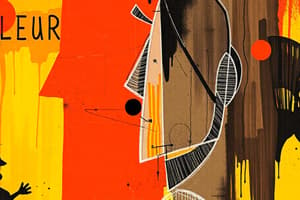Podcast
Questions and Answers
What is the primary focus of Teoryang Klasismo in literature?
What is the primary focus of Teoryang Klasismo in literature?
It emphasizes the depiction of simple events and the differences in character backgrounds and relationships.
In what way does Teoryang Feminismo impact the portrayal of women in literature?
In what way does Teoryang Feminismo impact the portrayal of women in literature?
It showcases women's strengths and challenges while aiming to elevate their perception in society.
How does Teoryang Realismo contribute to the reader's understanding of literature?
How does Teoryang Realismo contribute to the reader's understanding of literature?
It reflects real-life situations, emphasizing the author's observations of the surrounding world.
What unique element does Teoryang Imahismo emphasize compared to abstract language?
What unique element does Teoryang Imahismo emphasize compared to abstract language?
What does Teoryang Sikolohikal examine in characters of a literary work?
What does Teoryang Sikolohikal examine in characters of a literary work?
What is the significance of using symbols in Teoryang Arkitaypal?
What is the significance of using symbols in Teoryang Arkitaypal?
What aspect does Teoryang Moralistik explore in literature?
What aspect does Teoryang Moralistik explore in literature?
How does Teoryang Dekonstruksyon approach the interpretation of texts?
How does Teoryang Dekonstruksyon approach the interpretation of texts?
Ano ang layunin ng Bisa sa Damdamin sa panitikan?
Ano ang layunin ng Bisa sa Damdamin sa panitikan?
Paano nakakatulong ang Teoryang Historikal sa pag-unawa ng isang akdang pampanitikan?
Paano nakakatulong ang Teoryang Historikal sa pag-unawa ng isang akdang pampanitikan?
Ano ang pangunahing layunin ng Teoryang Feminismo?
Ano ang pangunahing layunin ng Teoryang Feminismo?
Ano ang kinakatawan ng Teoryang Markismo sa pagsusuri ng panitikan?
Ano ang kinakatawan ng Teoryang Markismo sa pagsusuri ng panitikan?
Bakit mahalaga ang Teoryang Kultural sa pag-aaral ng panitikan?
Bakit mahalaga ang Teoryang Kultural sa pag-aaral ng panitikan?
Ano ang pangunahing ideya na sinasalamin ng Teoryang Eksistensyalismo?
Ano ang pangunahing ideya na sinasalamin ng Teoryang Eksistensyalismo?
Ano ang koneksyon ng Teoryang Bayograpikal sa mga akda ng mga may-akda?
Ano ang koneksyon ng Teoryang Bayograpikal sa mga akda ng mga may-akda?
Paano nakakaapekto ang Teoryang Formalismo sa pagsusuri ng isang akda?
Paano nakakaapekto ang Teoryang Formalismo sa pagsusuri ng isang akda?
Flashcards are hidden until you start studying
Study Notes
Literary Theories: An Overview
- Literary theory is a framework used to understand and analyze literary texts.
- Key aspects:
- Subject matter: The central theme or topic of a literary work.
- Impact on readers: How the text affects readers' perspectives, emotions, and thoughts.
- Message: The author's intended message conveyed through the text.
Systematic Approach
- This approach emphasizes a systematic and organized study of literature.
- Focuses on the truth and beauty of literature, aiming to depict reality accurately.
- Seeks to understand literature's place within its historical context.
Diverse Literary Theories
- Classicism: Features simple events and highlights the contrast between characters' backgrounds and relationships.
- Humanism: Emphasizes human potential and capabilities, focusing on individual strengths and talents.
- Imagism: Utilizes vivid imagery to convey emotions and ideas, making the text more accessible compared to abstract language.
- Realism: Reflects real-life situations and experiences, often based on the author's observations of the world.
- Feminism: Explores the strengths and challenges faced by women, aiming to improve their representation and perception in society.
- Archetypal Theory: Focuses on recurring symbols in literature and their universal meanings.
- Formalism: Analyzes the structure and form of a text to understand how the author conveys ideas.
- Psychological Theory: Examines the motivations and behaviors of characters using psychological principles.
- Existentialism: Emphasizes individual freedom, choice, and responsibility.
- Romanticism: Celebrates human love for family, country, or God.
- Marxism: Analyzes societal conflicts and power imbalances, often related to social class and economic structures.
- Sociological Theory: Examines the social context of a literary work, looking at social conflicts and interactions.
- Moral Theory: Explores moral values and principles presented in the literature, often considering themes of right and wrong.
- Biographical Theory: Connect the author's personal experiences to the themes and content of their work.
- Queer Theory: Focuses on the representation and experiences of LGBTQ+ individuals in society and literature.
- Historical Theory: Examines the historical context surrounding the work, influencing its narrative and worldview.
- Cultural Theory: Focuses on the cultural heritage, beliefs, and practices reflected in the literature.
- Feminist-Marxist Theory: Investigates the intersection of women's struggles within social and economic structures.
- Deconstruction Theory: Emphasizes the multiplicity of interpretations and the reader's role in constructing meaning from a text.
Literary Theory
- Definition: A systematic approach to analyzing and understanding literature.
- Key Components:
- Subject: The topic or theme of the text.
- Impact on Behavior: How the text influences the reader's actions.
- Impact on Emotions: The feelings evoked in the reader by the text
- Impact on Thoughts: How the text influences the reader's thinking
- Message: The author's intended meaning.
Systematic Literary Theory
- Systematizes the study of literature.
- Emphasizes truth and beauty in literature.
- Literature should accurately portray reality.
- Highlights the historical significance of literature.
Types of Literary Theories
- Classicism: Literature should depict simple events, emphasizing the contrast between character backgrounds and relationships.
- Humanism: Focuses on human potential rather than divine control. Highlights human traits like intelligence and talent.
- Imagism: Uses vivid imagery to convey emotions and ideas. Easier to understand than abstract language.
- Realism: Reflects real-life situations. Focuses on the author's observations of the surrounding world.
- Feminism: Showcases women's strengths and challenges. Aims to elevate the perception of women.
- Archetypal: Focuses on recurring symbols in literature and their meanings.
- Formalism: Authors convey ideas through the structure of their work.
- Psychological: Explores characters' motivations and behaviors.
- Existentialism: Emphasizes individual freedom and choice.
- Romanticism: Showcases human love for family, country, or God.
- Marxism: Analyzes societal conflicts and power imbalances.
- Sociological: Examines the social context of a text and the society's conflicts.
- Moralistic: Explores moral values and principles presented in the literature.
- Biographical: Connects the author's experience to their work.
- Queer: Elevates the presence of homosexuals in society and literature.
- Historical: Examines the historical context influencing the narrative.
- Cultural: Showcases cultural heritage, beliefs, and practices in literature.
- Feminist-Marxist: Investigates women's challenges within social and economic structures.
- Deconstruction: Emphasizes multiple interpretations and focuses on the reader's reaction to the text.
Studying That Suits You
Use AI to generate personalized quizzes and flashcards to suit your learning preferences.




